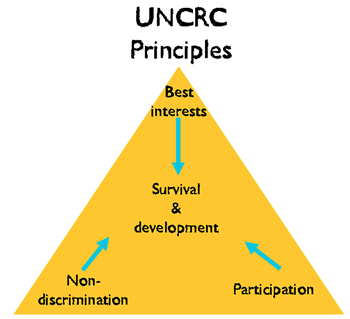UNCRC guiding principles

The guiding principles are crucial to understanding how to fully implement the UNCRC. They provide the means by which the substantive articles are interpreted and achieved. In keeping with the indivisibility principle of human rights each of the guiding principles must be considered alongside each article.
They are often described as instrumental rights - rights of good process that children should enjoy. It has been said that through adopting this approach the Convention becomes more than a mere list of obligations and instead acquires a soul!
The guiding principles of the Convention on the Rights of the Child are to be found in Articles 2, 3, 6 and 12.
Article 2
Non-discrimination
All rights apply to all children without exception. It is the State's obligation to protect children from any form of discrimination and to take positive action to promote their rights.
For full text of Article 2 click here
This means that the Convention applies to all children, whatever their race, religion or abilities; whatever they think or say, whatever type of family they come from. It doesn’t matter where children live, what language they speak, what their parents do, whether they are boys or girls, what their culture is, whether they have a disability or whether they are rich or poor. No child should be treated unfairly on any basis – children have a right to be actively protected against all forms of discrimination.
The non-discrimination article emphasises the importance of considering the impact of policy /legislation/project development/service design/delivery on children as a distinct group as well as in relation to the most disadvantaged and marginalised children.
Article 3
Best interests of the child
All actions concerning the child shall take full account of his or her best interests. The State shall provide the child with adequate care when parents, or others charged with that responsibility, fail to do so.
For full text of Article 3 click here
This means that the best interests of children must be the primary concern in making decisions that may affect them. This principle endeavours to redress the low priority often given to children's interests when there are strong, competing interests.
It places an obligation on decision makers, budget, and law and policy makers to always consider whether a decision will have an impact on children's lives, to assess what that impact will be, and to elevate children's interests to the level of a primary consideration in the final decision.
For the relationship between this provision and Article 12, see below.
Article 6
Survival and development
Every child has the inherent right to life, and the State has an obligation to ensure the child's survival and development.
For full text of Article 6 click here
Governments should ensure that children survive and develop healthily. Children have the right not just to life as is established for all human beings through the Declaration on Human Rights but more specifically they have the right to the maximum available resources that are necessary to support them to achieve their maximum possible potential.
Article 12
The child's opinion
The child has the right to express his or her opinion freely and to have that opinion taken into account in any matter or procedure affecting the child.
For full text of Article 12 click here
When adults are making decisions that affect children, children have the right to say what they think should happen and have their opinions taken into account.
This does not mean that children can now tell their parents what to do. The Convention encourages adults to listen to the opinions of children and involve them in decision-making.
Article 12 does not interfere with parents' right and responsibility to express their views on matters affecting their children.
There is no tension between articles 3 and 12, only a complementary role of the two general principles: one establishes the objective of achieving the best interests of the child and the other provides the methodology for reaching the goal of hearing either the child or the children. In fact, there can be no correct application of article 3 if the components of article 12 are not respected. Likewise, article 3 reinforces the functionality of article 12, facilitating the essential role of children in all decisions affecting their lives.
The Convention recognises that the level of a child’s participation in decisions must be appropriate to the child's level of maturity. Children's ability to form and express their opinions develops with experience. Most adults will give the views of teenagers greater weight than those of a younger child, whether in family, legal or administrative decisions but children's capacity for mature decision making can develop at a very young age provided children are given opportunities to experience this process.
Listening to children leads to a better understanding of the realities of children's lives and to understanding the causes of violated rights. It means engaging with children as citizens who are able to contribute to their own development. It requires practitioners to take into account children's opinions in decision-making and is complemented by other participation rights that assure children the information they need, i.e. freedom of expression and association.
Useful links